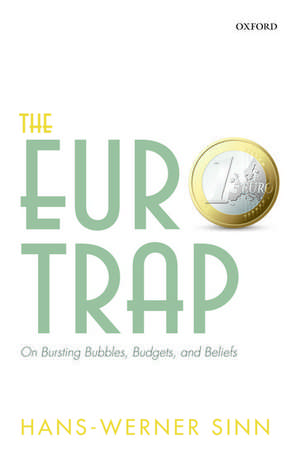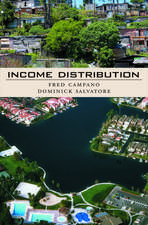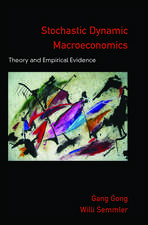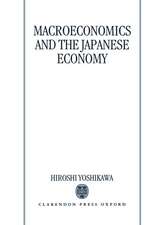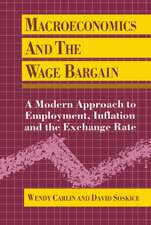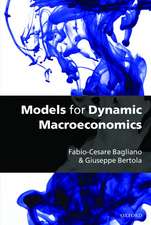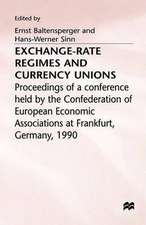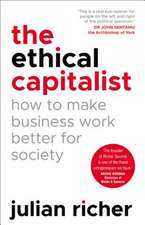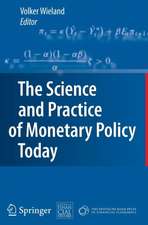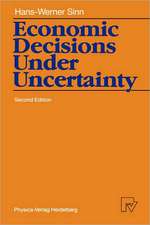The Euro Trap: On Bursting Bubbles, Budgets, and Beliefs
Autor Hans-Werner Sinnen Limba Engleză Paperback – 25 ian 2017
| Toate formatele și edițiile | Preț | Express |
|---|---|---|
| Paperback (1) | 219.87 lei 31-37 zile | |
| OUP OXFORD – 25 ian 2017 | 219.87 lei 31-37 zile | |
| Hardback (1) | 303.32 lei 31-37 zile | |
| Oxford University Press – 31 iul 2014 | 303.32 lei 31-37 zile |
Preț: 219.87 lei
Nou
Puncte Express: 330
Preț estimativ în valută:
42.08€ • 43.68$ • 35.09£
42.08€ • 43.68$ • 35.09£
Carte tipărită la comandă
Livrare economică 12-18 martie
Preluare comenzi: 021 569.72.76
Specificații
ISBN-13: 9780198791447
ISBN-10: 0198791445
Pagini: 416
Ilustrații: 59 Figures and 5 Tables
Dimensiuni: 155 x 231 x 22 mm
Greutate: 0.6 kg
Editura: OUP OXFORD
Colecția OUP Oxford
Locul publicării:Oxford, United Kingdom
ISBN-10: 0198791445
Pagini: 416
Ilustrații: 59 Figures and 5 Tables
Dimensiuni: 155 x 231 x 22 mm
Greutate: 0.6 kg
Editura: OUP OXFORD
Colecția OUP Oxford
Locul publicării:Oxford, United Kingdom
Recenzii
This detailed, heavily footnoted book by prominent German economist Sinn (Univ. of Munich) assesses the euro and the ongoing concerns about the economies of the euro-zone countries. He provides considerable data, often on individual countries (e.g., Greece, Ireland, Spain, and Italy), and retains a clear point of view on what occurred and why.
Professor Sinn has again enlightened and provoked us, and offered strong policy medicine. In his view, the southern tier should temporarily exit the Eurozone, devalue, and establish fiscal order with clear financial and public balance sheets, hence regaining competitiveness. A new EUrestructured as a federal state with a US-type financial system, tight fiscal constraints on the states, a new target balance settlement system, and interregionally-neutral monetary policywould then welcome them back on new terms. This model is contrasted with Sinns view of existing policyforced huge north-to-south capital transfers (debt mutualization) and a printing-press central bankwhich he believes has resulted in recurrent bubbles, the acceptance of southern tier non-competitiveness, and a history of stumbling from crisis to crisis [continued below].
Sinn lays out all of the relevant issues, and in the process teaches us how Europe got into this pickle. Complex puzzles are solved, myths exposed, and the arcane explained in non-technical terms. While others will surely disagree with this analytical and historical perspective, they must now deal with Sinns clear delineation of the relevant issues and explain how they weight and interpret these issues differently. All readers will gain perspective and learn much from Sinns timely effort. The book is a must-read for all who are interested in thinking through the web of difficult questions now facing Europe; I highly recommend it.
The Euro Trap merits a wide audience. The book has many strengths. It is detailed, but easily read. It recognizes and agrees that a driving force behind the euro is politicalto strengthen Europe and prevent future wars, so the euro must be strengthened, not abandoned. Most of all, it is honest in showing that the long euro crisis is not just a financial crisis, as many want us to believe. Differences in costs of production across Europe prevent recovery. Sinn concludes that to restore competitiveness in the indebted countries these countries should exit the euro temporarily and depreciate. The author recognizes that making that adjustment will not be costless or simple, but it is necessary and sufficient to restore growth.
With his customary energy and directness, Hans-Werner Sinn in this important book rethinks the origins of the current dangerous weakness in the Eurozone, and considers possible repairs. He sees through the immediate financial complexity to the deeper underlying problems that have to be resolved. One of these is that in a monetary union without a common fiscal policy the central bank is driven to de facto fiscal actions. Another is that the peripheral countries suffer not merely from an overhang of debt but from a lasting need for real devaluation, with the loss of income it entails. Not everyone will agree with the remedies Sinn proposes, but then he forces them, if they are serious, to come up with genuine alternatives. Sinn is a heavyweight.
The great financial machine is still running, but Hans-Werner Sinn puts me in mind of an exacting, careful engineer who has detected a design flaw deep in its works that had been overlooked by everyone else. This is the book of this discovery and it is so thrilling and so full of disquieting detail that I read it in one sitting.
Hans-Werner Sinns Euro Trap starkly lays out the fundamental weaknesses of the Eurosystem. The book does not limit itself to pointing out the mistaken approach of the euro rescue policies; it also proposes new strategies to attain long-term stability for the currency union.
The book offers a comprehensive view of the European balance-of-payments crisis and the associated competitiveness crisis that haunts southern Europe, basing its analysis on a rich body of indisputable, but so far little or only partially known, empirical facts. This important work lifts a veil from before our eyes.
Hans-Werner Sinn describes what is wrong with the Eurozone in its current form, and that bold reforms are needed. This book is an important contribution to the Eurozone debate, and a must-read for everyone who wishes to participate in it.
The Euro Trap is a brave and brilliant analysis of the quagmire that the Eurozone has fallen into. Hans-Werner Sinns lucid and lively description of the monetary transfers from north to south, and his proposed exit strategies, must be studied carefully by citizens and policymakers in Europe and around the world.
Hans-Werner Sinn has produced perhaps the most important scholarly book on the euro in at least a decade, one that should be read carefully by all sides of the debate. His aim is to provide balanced objective insights, not to offer polemic support or criticism. Sinns basic thesis is that only by making the euro system more transparent and more democratic can its potentially very bright future be ensured.
Hans-Werner Sinn once again brilliantly manages to explain complex interactions in easily understandable terms to deliver an important message.
Sinn offers a sobering look back combined with a realistic list of options going forward. A must read for anyone who wants to know where Europe is headed and what it would take to save the euro.
Sinns forthright acceptance that those who opposed Germanys adoption of the Euro were right after all, sets the tough-minded and honest tone of this provocative book, which offers penetrating analysis of what went wrongand rightwith the system as well as howand how notit might be repaired. It is required reading for all who worry about Europes future.
Hans-Werner Sinn offers a clear, comprehensive analysis of the euro rescues. He shows how politicians get mired ever more deeply in the assumption of liabilities at taxpayers expense, although it is already clear that a large portion of the credits granted will never be repaid. A gripping book for those who do not blindly swallow political pronouncements, but want to understand what is actually going on. A must-read for our political representatives, so that they understand what they are doing.
Hans-Werner Sinn has emerged as the most prolific and profound economist in Germany, writing on the euro and indeed much else. This book is a tour de force.
I was riveted. With this book, Sinn has finally written his masterpiece. It is so well written that even non-economists can easily understand it. It jolts you up without ever veering into hyperbole.
Hans-Werner Sinn is a master at presenting research findings understandably and yet accurately to a wider readership. An important book!
In his masterly analysis Hans-Werner Sinn unravels the tangled tale of the Euro crisis with remarkable patience, wisdom and clarity. His painstaking analysis makes it clear that the Eurosystem is unsustainable without major reforms, and his bold recommendations for how to carry out those reforms deserve to be taken seriously by everyone.
Hans-Werner Sinn has written an exceptional book on the euro crisisrich in substance and yet understandable for the layman. It is to be hoped that it not only will be read, but taken to heart by politicians.
Hans-Werner Sinn offers an outstandingly clear overview of the perils posed by excessive sovereign debt and by the divergence in competitiveness across the EU. The steep increase in the credit that the southern countries have received from the ECB and the corresponding risk brought upon the assets of the stable members are rightly emphasised.
In this trenchant analysis of Europes recent economic experience, Hans-Werner Sinn conducts a post-mortem for the Euro as an ambitious political gambit that has failed to overcome bad incentives and missing institutions. His forensic investigation uncovers staggering fiscal commitments that have been made through the conduct of monetary policy and without the explicit recognition or approval of those on whom the burdens will fall. Sinn issues a call to action, making a compelling case that the most important obstacle on the path to European stability and prosperity is a system that is illogical and unsustainable. This excellent book virtually compels a response from those who would substitute hope for facts in their defense of the Euro and its prospects.
Professor Sinn has again enlightened and provoked us, and offered strong policy medicine. In his view, the southern tier should temporarily exit the Eurozone, devalue, and establish fiscal order with clear financial and public balance sheets, hence regaining competitiveness. A new EUrestructured as a federal state with a US-type financial system, tight fiscal constraints on the states, a new target balance settlement system, and interregionally-neutral monetary policywould then welcome them back on new terms. This model is contrasted with Sinns view of existing policyforced huge north-to-south capital transfers (debt mutualization) and a printing-press central bankwhich he believes has resulted in recurrent bubbles, the acceptance of southern tier non-competitiveness, and a history of stumbling from crisis to crisis [continued below].
Sinn lays out all of the relevant issues, and in the process teaches us how Europe got into this pickle. Complex puzzles are solved, myths exposed, and the arcane explained in non-technical terms. While others will surely disagree with this analytical and historical perspective, they must now deal with Sinns clear delineation of the relevant issues and explain how they weight and interpret these issues differently. All readers will gain perspective and learn much from Sinns timely effort. The book is a must-read for all who are interested in thinking through the web of difficult questions now facing Europe; I highly recommend it.
The Euro Trap merits a wide audience. The book has many strengths. It is detailed, but easily read. It recognizes and agrees that a driving force behind the euro is politicalto strengthen Europe and prevent future wars, so the euro must be strengthened, not abandoned. Most of all, it is honest in showing that the long euro crisis is not just a financial crisis, as many want us to believe. Differences in costs of production across Europe prevent recovery. Sinn concludes that to restore competitiveness in the indebted countries these countries should exit the euro temporarily and depreciate. The author recognizes that making that adjustment will not be costless or simple, but it is necessary and sufficient to restore growth.
With his customary energy and directness, Hans-Werner Sinn in this important book rethinks the origins of the current dangerous weakness in the Eurozone, and considers possible repairs. He sees through the immediate financial complexity to the deeper underlying problems that have to be resolved. One of these is that in a monetary union without a common fiscal policy the central bank is driven to de facto fiscal actions. Another is that the peripheral countries suffer not merely from an overhang of debt but from a lasting need for real devaluation, with the loss of income it entails. Not everyone will agree with the remedies Sinn proposes, but then he forces them, if they are serious, to come up with genuine alternatives. Sinn is a heavyweight.
The great financial machine is still running, but Hans-Werner Sinn puts me in mind of an exacting, careful engineer who has detected a design flaw deep in its works that had been overlooked by everyone else. This is the book of this discovery and it is so thrilling and so full of disquieting detail that I read it in one sitting.
Hans-Werner Sinns Euro Trap starkly lays out the fundamental weaknesses of the Eurosystem. The book does not limit itself to pointing out the mistaken approach of the euro rescue policies; it also proposes new strategies to attain long-term stability for the currency union.
The book offers a comprehensive view of the European balance-of-payments crisis and the associated competitiveness crisis that haunts southern Europe, basing its analysis on a rich body of indisputable, but so far little or only partially known, empirical facts. This important work lifts a veil from before our eyes.
Hans-Werner Sinn describes what is wrong with the Eurozone in its current form, and that bold reforms are needed. This book is an important contribution to the Eurozone debate, and a must-read for everyone who wishes to participate in it.
The Euro Trap is a brave and brilliant analysis of the quagmire that the Eurozone has fallen into. Hans-Werner Sinns lucid and lively description of the monetary transfers from north to south, and his proposed exit strategies, must be studied carefully by citizens and policymakers in Europe and around the world.
Hans-Werner Sinn has produced perhaps the most important scholarly book on the euro in at least a decade, one that should be read carefully by all sides of the debate. His aim is to provide balanced objective insights, not to offer polemic support or criticism. Sinns basic thesis is that only by making the euro system more transparent and more democratic can its potentially very bright future be ensured.
Hans-Werner Sinn once again brilliantly manages to explain complex interactions in easily understandable terms to deliver an important message.
Sinn offers a sobering look back combined with a realistic list of options going forward. A must read for anyone who wants to know where Europe is headed and what it would take to save the euro.
Sinns forthright acceptance that those who opposed Germanys adoption of the Euro were right after all, sets the tough-minded and honest tone of this provocative book, which offers penetrating analysis of what went wrongand rightwith the system as well as howand how notit might be repaired. It is required reading for all who worry about Europes future.
Hans-Werner Sinn offers a clear, comprehensive analysis of the euro rescues. He shows how politicians get mired ever more deeply in the assumption of liabilities at taxpayers expense, although it is already clear that a large portion of the credits granted will never be repaid. A gripping book for those who do not blindly swallow political pronouncements, but want to understand what is actually going on. A must-read for our political representatives, so that they understand what they are doing.
Hans-Werner Sinn has emerged as the most prolific and profound economist in Germany, writing on the euro and indeed much else. This book is a tour de force.
I was riveted. With this book, Sinn has finally written his masterpiece. It is so well written that even non-economists can easily understand it. It jolts you up without ever veering into hyperbole.
Hans-Werner Sinn is a master at presenting research findings understandably and yet accurately to a wider readership. An important book!
In his masterly analysis Hans-Werner Sinn unravels the tangled tale of the Euro crisis with remarkable patience, wisdom and clarity. His painstaking analysis makes it clear that the Eurosystem is unsustainable without major reforms, and his bold recommendations for how to carry out those reforms deserve to be taken seriously by everyone.
Hans-Werner Sinn has written an exceptional book on the euro crisisrich in substance and yet understandable for the layman. It is to be hoped that it not only will be read, but taken to heart by politicians.
Hans-Werner Sinn offers an outstandingly clear overview of the perils posed by excessive sovereign debt and by the divergence in competitiveness across the EU. The steep increase in the credit that the southern countries have received from the ECB and the corresponding risk brought upon the assets of the stable members are rightly emphasised.
In this trenchant analysis of Europes recent economic experience, Hans-Werner Sinn conducts a post-mortem for the Euro as an ambitious political gambit that has failed to overcome bad incentives and missing institutions. His forensic investigation uncovers staggering fiscal commitments that have been made through the conduct of monetary policy and without the explicit recognition or approval of those on whom the burdens will fall. Sinn issues a call to action, making a compelling case that the most important obstacle on the path to European stability and prosperity is a system that is illogical and unsustainable. This excellent book virtually compels a response from those who would substitute hope for facts in their defense of the Euro and its prospects.
Notă biografică
Hans-Werner Sinn is Professor of Economics and Public Finance at the University of Munich, President of the Ifo Institute - Leibniz-Institute for Economic Research, Director of the University of Munich's Center for Economic Studies, and President of CESifo. He is a member of the Council of Economic Advisors to the German Ministry of Economics as well as former president of the International Institute of Public Finance (IIPF) and of the Verein für Socialpolitik, the association of German-speaking economists. He holds honorary doctorate degrees from the universities of Magdeburg, Helsinki, and the HHL Leipzig Graduate School of Management, and has been knighted with the Maximilian Order. He is the author of more than 20 monographs and 135 scientific articles. The British newspaper The Independent nominated him as one of the "ten people who changed the world" in 2011. The German Business weekly Wirtschaftswoche ranked Sinn 62 among the 100 most powerful people in Germany.
